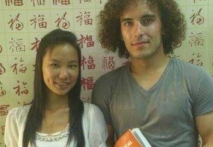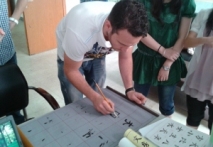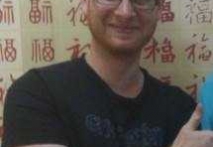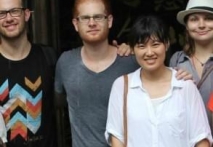Latest News
- Wuxi's Nanchang Street--a historic cultural district that combines classical charm, delicious food, and fun activities
- chinese study
- lastest courses
- Business Assistance/International Consortium of Stem Cell Research
- Foreigner's view of Jiangsu -Changzhou Jintan starts
- estimonials for Our new French Internship student Anais 企业表扬信
- The Double Seventh Festival in China Introduction
- Chinese Proficiency Test (HSK)
- China University Mining and Technology
- Wuxi Library
Students Say
Mandarin Student Zack
Mandarin Education School is a great place to learn Chinese and Chinese Culture.I've learned a lot in this school, my Chine...
Learn Chinese Travel China
If you want to learn Chinese and also discover China, Mandarin Education organize the most funny and cultural study tour.
The...
suzhou Mandarin Jude
I am Jude, I am learning Mandarin in Suzhou Mandarin School,I was learning in Wuxi Mandarin Education too.I like my Chinse Teacher...
chinese class
Improve your reading, speaking and your writing by experiencing our teaching methods,Offer free student Visa.
...
Wuxi Mandarin Jessie
I've learned Chinese for almost 8 years, I can understand what Chinese people say,but when I speak, I feel very uncomfor...
Chinese Internship or Jobs
You are looking for a professional experience abroad? Get the opportunity to discover the Chinese business,Look for an ...
Mandarinedu Student Florent
I love my Wuxi Mandarin Education School. It is the EASY MANDARIN Learning way, I am learning faster than I wanted.My teach...
Mandarin E Learning
Mandarin Education School offers you Online Chinese Courses. It has never been so easier to have Chinese courses ...
Mandarin Student Brad
I am studying Chinese in Mandarin Education School. I can speak quit good Chinese and talk to Chinese people by myself. Thank...
Wuxi Mandarin edu. Student Jennifer
I love learning Chinese in Mandarin Education School.That's a great place to learn and make friends.
...
Add Our School Official
to get more informations

0086 1866 1199 988
0086 510-81151808
Sandy.Swun
519988808
Mandarin Education School
Room 405, 4 Fl,Building No.8,
Maoye Business Center,
Chang jiang No.1,
New district , Wuxi City , China

By David De Cremer
China is the second-largest economy in the world and expected to surpass the US in the next decade. This shift in economic power makes it even more important for Western executives to build successful, high-quality relationships with their Chinese counterparts. But such relationships don’t always come easily. Consider the following examples:
· Western representatives of a multinational thought their negotiations with an important Chinese supplier were almost finalized when the Chinese negotiators started asking questions the Western side believed had already been agreed on. It made the Western negotiators feel as if the Chinese side had made no attempt to understand their concerns.
· An international company created a platform its R&D centers could use to share their latest developments and discuss any challenges. The idea was to encourage each R&D center to be more pro-active in responding to changing market conditions. However, it became apparent that the Chinese R&D center was hardly participating.
· An international head of department based in Wenzhou faced difficulties on a regular basis for his Chinese managers to accept overseas assignments. This international manager was unclear about why some of his Chinese managers were so hesitant to develop strategic relationships with non-Chinese staff elsewhere in the world.
What is the common problem underlying all of these three examples? It all has to do with trust, and how it’s built.
Depending on one’s cultural background, trust may be developed and defined in different ways. I have spent years studying the function trust in business, and have taught business leaders in both the West and in China. It is important to stress that no difference exists between both parties regarding the importance of trust to the development of the business process. All human beings, regardless of their cultural background, have a strong desire to develop relationships, and trust is crucial in this process.
The main differences lie in how people from the West and China work towards building a trusting relationship, which is reflected in what their (dis)trust default is, and how this influences the function of trust is in the relationship being developed. (Of course, people in both cultures are individuals – the patterns I’ve observed in each culture are sweeping, and won’t apply to everyone.)
What is your trust default?
Trust is usually defined as a positive expectation that the other party will act in honest and benevolent ways, reducing fear that one may be exploited. Considering both parts of this can help us distinguish the trust defaults in the West versus China.
Generally speaking, in the West the default is “trust.” I’ll give you the benefit of the doubt, and consider you basically trustworthy until you do something that breaks our trust. In China, the default tilts more toward “distrust” – I only award you my trust after you’ve proven yourself worthy of it. This attitude is illustrated in an eloquent way by the popular Chinese saying that “early birds get shot” (qiang da chu tou niao) – which reflects the strong desire to avoid any social risks. Clearly such an attitude does not invite people easily to engage in a more Western-like trust giving process.
As one Chinese business executive told me: In China you build trust first, once that is achieved, only then you do business. In the West, on the other hand, people are used to doing business almost immediately when they work in the same industry. Westerners feel more comfortable conducting business and building trust at the same time, if the opportunity arises.
As the research of Roy Chua, an associate professor at Singapore Management University, has found, American executives make a strong distinction between trust from the head (i.e. trusting someone because of his or her professional competence) and trust from the heart (i.e. trusting someone because of your relationship with him or her); whereas for Chinese executives both types of trust are needed. These findings emphasize again the need for interpersonal trust to be established and exist before conducting business in China.
What is the initial function of trust?
Where do these defaults come from? To answer this question, we have to examine how people in each culture define the initial function of trust. Put simply, in China the primary function of trust is to protect and establish feelings of safety initially. In the West, it’s more to explore and establish where possible fertile ground for future opportunities.
The West is considered an individualistic culture, in which people need to acquire the skill to build alliances and networks to survive. As a result, within individualistic cultures people have learned to take a more active approach to building relationships, and defaulting to trust becomes the norm. China is not an individualistic culture, but neither is it – as claimed incorrectly by many people – a collectivistic culture. It is a relational culture. Guanxi is a Chinese concept referring to the tight social networks that shape Chinese society. Almost automatic trust exists between people in the same guanxi, but trust is never assumed outside of it. So distrust becomes a default — only if one is certain that a new relationship will not threaten, but rather preserve, the interest of one’s closest relationships, will trust then be given.
In light of building international business, it is clear that from a Chinese perspective you will need to earn trust first before things get moving.
How can Western businesspeople establish trust with their Chinese counterparts?
So, from a Western point of view, how should one approach business situations in China when they involve building interpersonal trust?
Taking time to develop the relationship is a must. Chinese businesspeople will invest considerable time in getting to know you. While you, from a Western point of view, may think you are already discussing business deals, your Chinese counterpart may not even be thinking about the deals that could be made – he or she may still be evaluating you. Although this may be frustrating at times because it seems like business is going nowhere, keep in mind that once you are perceived as trustworthy things will move very quickly.
Because in the initial stages, no personal relationship exists yet, be aware that trying to build trust through mainly social means might backfire. Organizing parties or giving gifts can work against you. Early on, it is more important that you show what your value will be to their business. At this stage it is also necessary to remember that it is most important to demonstrate your competence and expertise rather than just simply talk about it.
Once a business relationship takes off and you are working with Chinese managers and employees, keep building on this foundation. It is important that the Chinese counterpart feels that throughout the business process a sense of benevolence exists, which will make for good business on the long term. Keep in mind that although building trust in China is a highly participative and time consuming activity, the level of trust that can be achieved can be forever. As a popular Chinese saying mentions: Once a promise is made, it cannot be withdrawn, not even with the forces of four horse powers (yi yan ji chu, si ma nan zhui).










